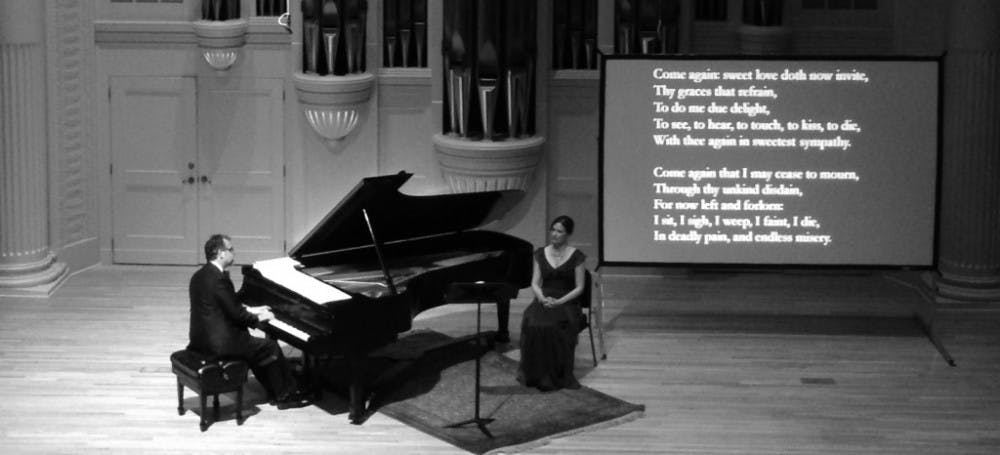Captivating, haunting, playful, emotional, romantic and comical.
These words encapsulate the performance of husband and wife team Hallie and Charles Hogan as they took the stage Sept. 19 in Whitley Auditorium at Elon University.
The program featured works by Giulio Caccini, John Dowland, Robert Pearson Thomas, Ludwig van Beethoven, Robert Schumann and Enrique Granados, all which circulate around a central theme – love.
Hallie, a mezzo-soprano, is an associate professor of music at Elon, and although she is no stranger to the stage, this is her first time in a while performing a program of this length anywhere, she said.
“It’s a wee bit daunting to get back up at this point and do something like this, I have to say, but I want to do it,” Hallie said. “I feel as a teacher that it’s important for my students to know me and I feel like this is the best way to get to know me: through my performance.”
Throughout life, a person’s voice transitions through different stages, which Hallie said was the reason for her period of rest, during which she still performed occasionally.
“I have to admit that as you get older it gets more challenging,” Hallie said. “It takes a little more work to get those little muscles in your neck to do what they are supposed to do. I think life is full of all kinds of different stages and you do the best you can where you are in every stage of life.”
http://www.youtube.com/watch?v=43pQ_c13O2o Video by Kelsey Higgins.
Hallie, accompanied by husband Charles on the piano, took the stage as if she had never been away. The two brought nothing short of their best.
A projector on stage showed a synopsis of each song as the program progressed.
“Hallie and I thought that this would be a good way to understand the content of the song and still be engaged in the music instead of being too concerned with the lyrics,” Charles said.
Throughout the concert the paraphrases brought new meaning to the solo piano works, composed by John Dowland and Enrique Granados.
Charles played these selections with beautiful phrase movement, musicality, dynamic contrast and a subtle ease that invited audiences to lose themselves in the music.
During his solo performance of the Beethoven piece, Charles’s fingers danced almost effortlessly over the keys, and his entire body personified each musical phrase as if he was part of the piano.
At one point, he suspended the resolution of a phrase and playfully turned to look at audience members as if taunting them, and he continued to glance back occasionally as he began a new cheerful melodic phrase.
Hallie, who wore a flowing purple dress and jewelry that sparkled under the stage lighting, performed with great control, diction and emotion.
With every piece she sang, Hallie successfully told a story that captivated attendees from start to finish.
Senior Ashley Watkins, a music major, said one of the more memorable pieces was Richard Pearson Thomas’s version of “Amarilli, mia bella.”
Hallie’s body moved with every phrase while Charles played a haunting bass line on the piano strings with a set of mallets. Hallie’s voice flowed through the 20th century melodies with well-controlled intonation and dynamics.
The concert concluded with a piece by Dominick Argento entitled “Miss Manners on Music.”
The piece was commissioned in 1998 for American journalist Judith Martin, more commonly known by her pen name, Miss Manners.
“Chances are if you don’t know who she is, you should,” Charles said.
Hallie said she was very popular.
“People would read her articles to get advice basically on manners in all sorts of situations,” Hallie said. “These are songs that are based on specific letters written to her about manners at concerts.”
Hallie took on many different characters throughout the piece, and each had audience members laughing hysterically.
Of course, Charles added his own comical facial expressions and dances from the piano bench. The pair made quite the theatrical duo.
Perhaps the standout performance of the night, though, was of Schumann’s “Frauenliebe und Leben.”
“Hallie’s performance of the Schumann made me cry,” said Victoria Fischer Faw, professor of music.
Schuman wrote this piece, which is a song cycle about a woman’s love and life, for his wife Clara as a gift, according to Hallie.
Hallie’s facial expressions were visible from all the way in the balcony and the emotions she projected were so deep it was as if she truly was the character in the song.
“You spend all that time working and rehearsing because you want to communicate something with people,” Hallie said. “That’s ultimately what we are all trying to do. It’s not just about learning scales or learning languages or these sorts of things. The language and music is for communication.”
By the end of the evening, audience members walked away with a better understanding of the two seasoned musicians who graced the stage.


